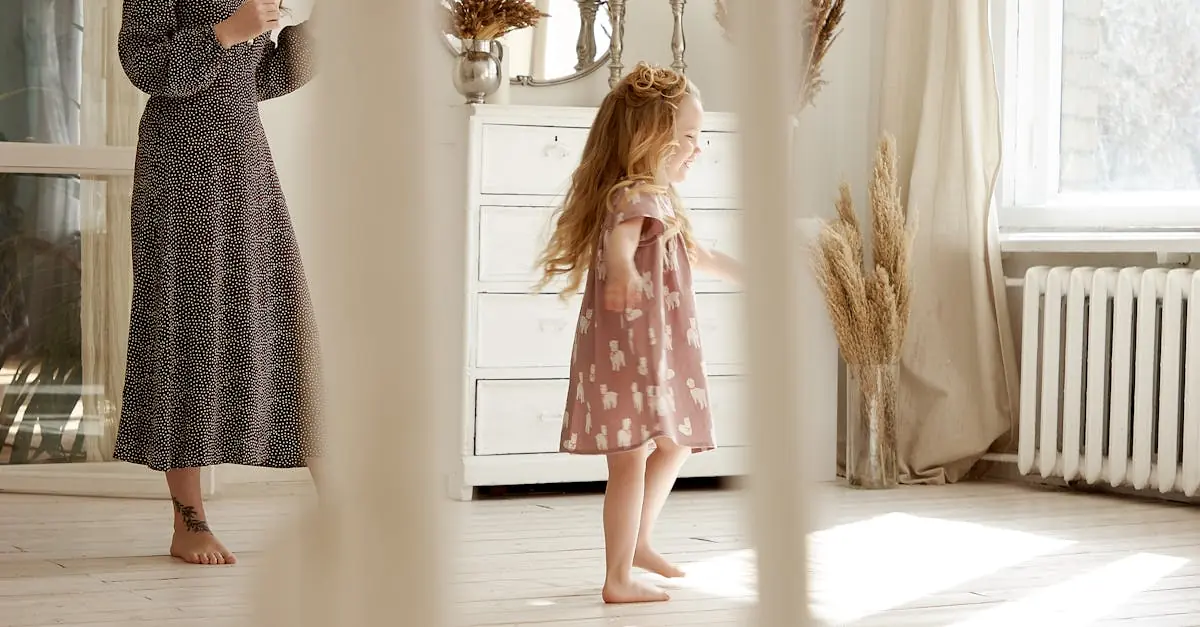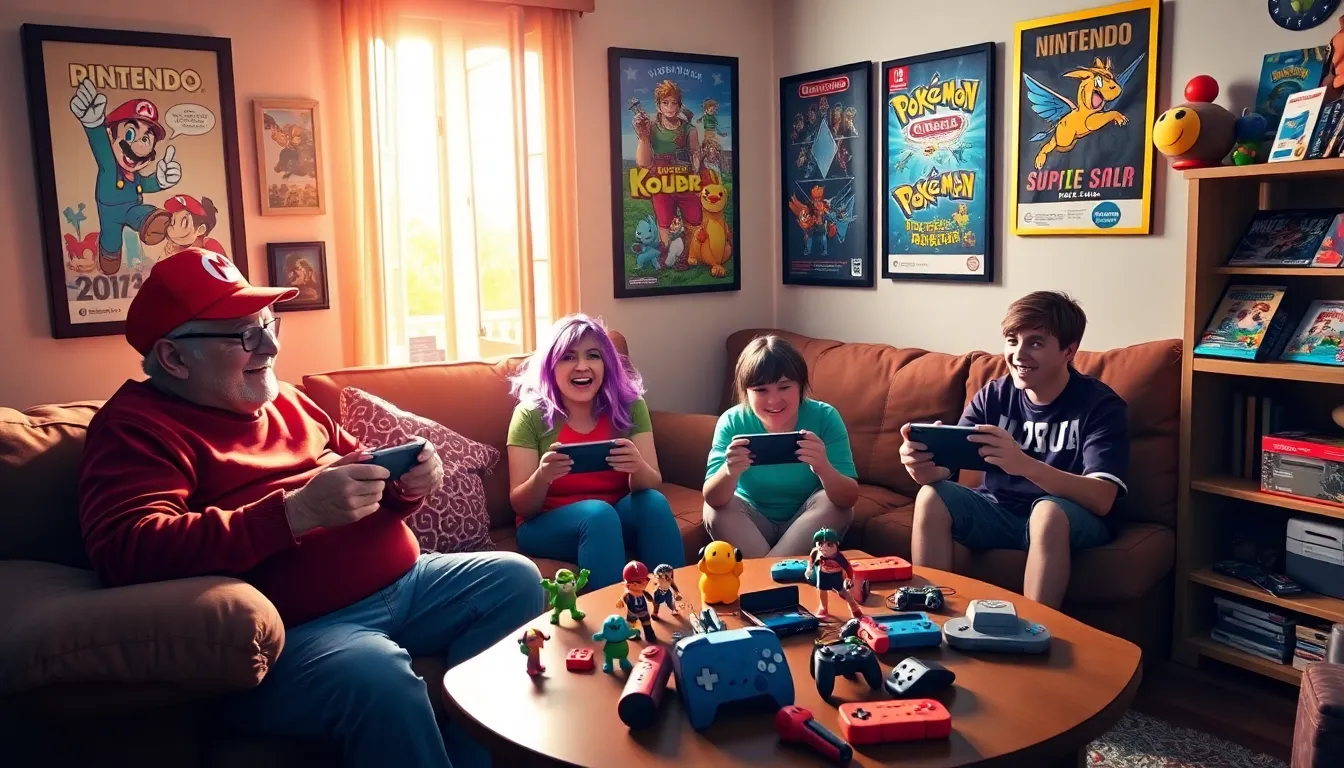Choosing the best parenting style can feel like trying to find the perfect pair of socks—everyone has their favorites, but what really keeps your feet warm? With a plethora of approaches out there, from authoritative to permissive, it’s easy to get lost in the parenting jungle. Each style comes with its own quirks and perks, making it a bit like picking the best pizza topping—everyone has an opinion, and there’s no one-size-fits-all solution.
Table of Contents
ToggleUnderstanding Parenting Styles
Different parenting styles shape children’s development in significant ways. Each style varies in approach and impact, making understanding them essential for effective parenting.
Authoritarian Parenting
Authoritarian parenting emphasizes strict rules and high demands. Parents often enforce obedience without room for discussion. This style can lead to children who respect authority, but it might also create issues with self-esteem and independence. Studies indicate that while children may perform well academically, they might struggle with social skills.
Permissive Parenting
Permissive parenting involves minimal demands and a lot of warmth. Parents often act more like friends than authority figures, which can foster creativity and confidence in children. However, boundaries may be weak, leading to behavioral issues. Research shows that these children can become impulsive and might lack self-discipline.
Authoritative Parenting
Authoritative parenting combines high expectations with emotional support. Parents encourage independence while establishing clear guidelines. Children raised in this environment typically exhibit strong self-regulation and social competence. Data indicates that this approach correlates with higher academic achievements and healthier emotional responses.
Uninvolved Parenting
Uninvolved parenting lacks responsiveness and demands from the parent. Children in these situations may feel neglected and experience various developmental challenges. Research highlights the risks of behavioral issues and emotional difficulties in children, making this style the least favorable. Establishing some emotional connection is vital for healthy development.
The Impact of Parenting Styles on Child Development
Understanding the influence of parenting styles on a child’s development shapes foundational aspects of their lives. Different styles contribute distinctively to emotional well-being, academic success, and social skills.
Emotional Well-being
Authoritative parenting fosters emotional stability in children. They experience higher self-esteem due to the supportive environment. Emotional support encourages children to express themselves freely, contributing to resilience. Conversely, authoritarian parenting can lead to anxiety and lower self-worth through strict expectations. Research shows that permissive parenting nurtures creativity but may leave children feeling insecure due to lack of guidance. Uninvolved parenting often results in emotional neglect, severely impacting children’s ability to form healthy relationships. Parents play a critical role in shaping their child’s emotional landscape through their approach.
Academic Success
Authoritative parenting correlates with better academic outcomes. Children thrive in structured environments with expectations balanced by support. The nurturing aspect encourages a love for learning and persistence in challenges. Authoritarian styles may contribute to high grades, yet often at the expense of critical thinking skills. Permissive parents may create a relaxed atmosphere, which could hinder focus on academics. Uninvolved parenting leaves children at a disadvantage academically due to a lack of support and motivation. Effective parental guidance enhances academic progression and skill development.
Social Skills
Social skills development hinges on parenting approaches. Authoritative parenting produces well-adjusted children with strong interpersonal skills. They learn empathy and conflict resolution through modeled behaviors. On the other hand, authoritarian parenting may inhibit social interactions, making it difficult for children to relate to peers. Permissive parenting encourages openness, yet it can lead to challenges with boundaries in social settings. Uninvolved parenting often leads to social withdrawal, leaving children ill-prepared for peer relationships. The influence of a parent’s style determines the child’s ability to navigate social landscapes effectively.
Evaluating Which Parenting Style Is the Best
Determining the best parenting style involves assessing various approaches and their impacts. Understanding the pros and cons of each style provides valuable insights.
Pros and Cons of Each Style
Authoritative parenting balances high expectations with emotional support. This approach encourages self-regulation in children. Authoritarian parenting creates strict rules, fostering discipline but often leading to anxiety and low self-esteem. Permissive parenting nurtures creativity and warmth, though it may result in impulsive behavior due to weak boundaries. Uninvolved parenting lacks responsiveness, posing risks for emotional well-being and development. Weighing these aspects helps parents make informed decisions.
Research Findings on Effectiveness
Numerous studies highlight authoritative parenting as the most effective style. Children raised in this environment often exhibit better academic success and social skills. Research indicates that authoritarian parenting may lead to higher grades but compromise critical thinking abilities. Permissive parenting encourages creativity yet can result in insecurity. Uninvolved parenting is linked to emotional neglect, affecting children’s development negatively. These findings underscore the importance of choosing an effective parenting style.
Tips for Choosing the Right Parenting Style
Selecting the appropriate parenting style requires thoughtful consideration of values, goals, and adaptability.
Assessing Your Values and Goals
Identifying personal values shapes parenting decisions. Parents prioritize qualities such as independence, discipline, creativity, and emotional health. Evaluating these values helps clarify what they hope to achieve through their parenting. It’s essential to consider how these goals align with the needs of the child. Reflecting on past experiences with authority can also influence preferences. Parents should engage in discussions about values with partners or co-parents. Doing so ensures a unified approach that supports consistent parenting.
Flexibility and Adaptability
Embracing flexibility proves beneficial in parenting. Children evolve, displaying unique personalities and varying needs. Parents adapt their styles in response to these changes, allowing for more effective guidance. Recognizing when a strategy may fall short is crucial. Parents can learn from experiences and adjust when necessary, ensuring they remain effective and supportive. Balancing authoritative expectations with nurturing behavior often results in optimal outcomes. Thus, staying open to modifying approaches can contribute significantly to a child’s emotional and social development.
Choosing the best parenting style isn’t a one-size-fits-all decision. Each approach offers distinct benefits and challenges that can shape a child’s development in various ways. While authoritative parenting emerges as a leading choice due to its balance of support and expectations, it’s essential for parents to consider their unique values and their child’s individual needs. Flexibility and adaptability in parenting strategies can lead to healthier emotional and social outcomes. Ultimately, the journey of parenting is about finding the right fit that nurtures growth and fosters a positive relationship between parent and child.






